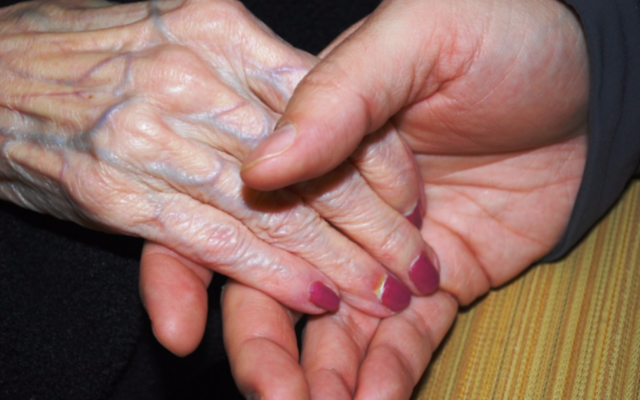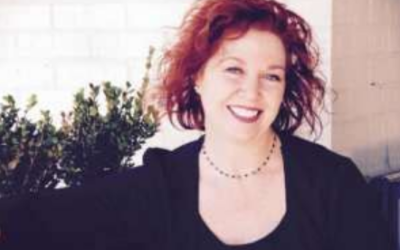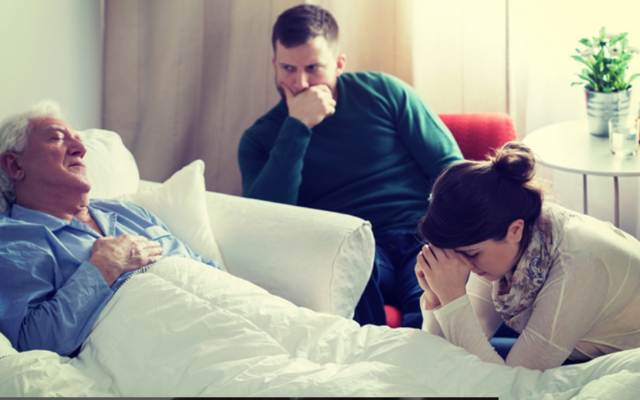End of Life Doulas Support the Dying
Personal care at the end of life is gaining acceptance as attitudes about death change.

They may be called spiritual shepherds, midwives for the soul or guides for the end of life, but those who are trained to help prepare the terminally ill for their final journey in life call themselves doulas.
Lisa Kaufman is an end-of-life doula. For the last four years she has been at the bedside of those in intensive care, spent time in hospice facilities and counseled clients during their final days at home, all in an effort to ease the physical and emotional pain that often accompanies the end of life. For those who have had had a good life, she want to provide a comfortable passing.
“It is a calling to me. It’s a little bit hard for me to even say those kinds of words, but as a Jewish person I don’t know how else to describe it. I am drawn to this work. I’m deeply sensitive to it. It is very intimate. It allows me to be very nurturing because that is just who I am.”

For 20 years Kaufman, who is a certified Aging Life Care manager, has owned and managed SeniorCare Options in Roswell. The firm helps to manage the care of seniors in declining health.
But four years ago she became convinced that she could do more to assure the peaceful transition of those who were facing the end of life. So she began the lengthy certification process to become a death doula.
“I want to make sure that people have the best possible experience in their final hours. I only have this one opportunity. So I want to do the best I can.”
Now as part of her professional services, she offers a program she calls The 11th Hour to comfort families who, with their loved ones, are facing some of life’s most difficult moments.
“There is just something so powerful about supporting somebody at such a tender time. And a lot of times it’s about supporting the family because the loved one is lying there and they’re not really very responsive. But the family doesn’t know what to do They’re in a lot of pain emotionally. So to be a strong support and model the kind of behavior that’s appropriate is very important. There are just so many taboos and biases about death and dying and people don’t know what to do.”
The idea of providing a training program to assist those facing issues at the end of life came from a conference in 1998 of The Jewish Board of Family and Children’s Services in New York. The result was The Doula Program to Accompany and Comfort.
In 2003, Henry Fersko-Weiss, a licensed clinical social worker, used the model of doulas who assist in the birth process at the beginning of life to create another early program for life’s end.
Today there are a number of such initiatives around the country, some incorporating concepts taken from home health care and nursing while others emphasizing more spiritual and psychological concerns. Since there are no licensing laws that govern end- of-life doulas and the services are not covered by insurance, there are many different approaches to the practice.
At the Parker Jewish Institute for Health Care and Rehabilitation in New York, the doula program is supported by a grant from a private foundation. Trained volunteers provide assistance in the Institute hospice program.
Across the country in San Francisco, The Melaveh Project, named for the Hebrew word that means “one who accompanies,” offers assistance in the home as well as area hospices. End-of-life services are provided by volunteers under the guidance of a trained and certified doula.
Herb Brosbe helps administer the program that uses volunteers for a limited set of end-of-life services.
“We don’t identify our volunteers as end-of-life doulas, we do identify them as Jewish trained to give support and companionship during this process. We just do a lot of listening. And then we may ask questions to try to understand the person better. Our object is companionship and being present, which makes our volunteers incredibly approachable.”

The growing acceptance of end-of-life services offered by doulas and those working with them owes much to the changes in attitudes about talking about death, which was once described as the last taboo.
The influential work of Swiss American psychiatrist Elisabeth Kubler-Ross, the 1969 bestseller “On Death and Dying,” is seen as a classic that made talking about death more acceptable.
As Kaufman sees it, we are more emotionally receptive today and more open to talk freely about our psychological and spiritual needs. It is what makes so satisfying what she describes as the journey she is on as a doula.
“It’s tikkun olam. I want to leave the world a better place. But I’m not always thinking about how this makes make me a good Jew, but I do have that spiritual experience as I’m sitting there quietly with somebody, I’m having my own thoughts while they are having theirs.”



comments